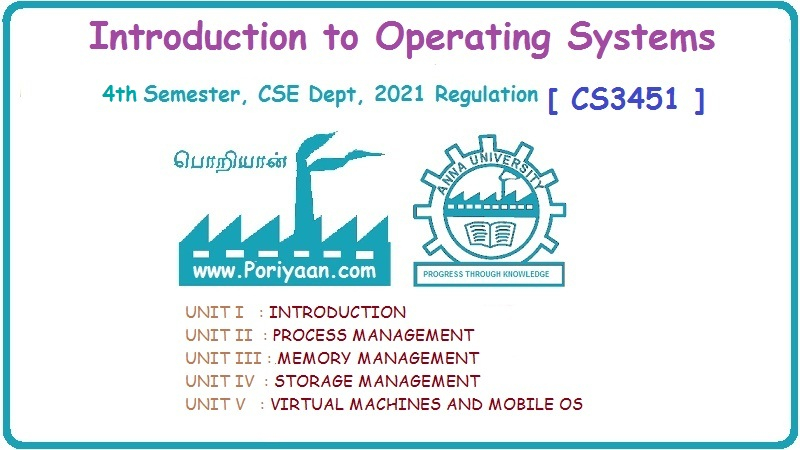Introduction to Operating Systems: Unit I: Introduction
Multiprocessor System
Introduction - Introduction to Operating Systems
Multiprocessor system means more than one processor in close communication. All the processor share common bus, clock, memory and peripheral devices.
Multiprocessor System
• Multiprocessor system means more than
one processor in close communication. All the processor share common bus, clock,
memory and peripheral devices.
• Multiprocessor system is also called
parallel system or tightly coupled systems. Multiprocessor operating systems
are just regular operating systems. They handle system calls, do memory
management, provide a file system, and manage I/O devices.
• Multiprocessor systems is also known as parallel systems or multicore systems.
•Features of Multiprocessor Systems
:
1.The
processor should support efficient context switching operation.
2.
It supports large physical address space and larger virtual address space.
3. If one processor fails, then other
processors should retrieve the interrupted process state so that execution of
the process can continue.
4.The
inter-process communication mechanism should be provided and implemented in
hardware as it becomes efficient and easy.
•
Multiprocessors can be used in different ways:
1. Uniprossesors (single-instruction,
single-data or SISD)
2. Within a single system to execute
multiple, independent sequences of instructions in multiple contexts
(multiple-instruction, multiple-data or MIMD); 3. 3.A single sequence of
instructions in multiple contexts (single-instruction, multiple-data or SIMD,
often used in vector processing);
4.
Multiple sequences of instructions in a single context (multiple-instruction,
single-data or MISD, used for redundancy in fail-safe systems and sometimes
applied to describe pipelined processors or hyper threading).
Advantages and Disadvantages of Multiprocessor Systems
Advantages of Multiprocessor Systems:
1. Throughput : Throughput increases because number of processor is increases.
2. Cost:Multiprocessor system is
cheaper than the multiple single processor Ang system.
3.
Reliability: If one
processor fails, it has no effect on whole system operation.
4. Response time :
Response time is less because of increased number of
processor.
•
Disadvantages of Multiprocessor Systems :
1. Multiprocessor systems are more
complex in both hardware and software.
2.
Additional CPU cycles are required to manage the cooperation, so per-CPU
efficiency goes down.
• Multiprocessor systems are of two
types: Symmetric multiprocessing and asymmetric multiprocessing.
Symmetric Multiprocessing
• The simplest multiprocessors are based
on a single bus. In symmetric multiprocessing, number of homogeneous processor
are running independently without affecting other programs.
• Systems that treat all CPUs equally
are called symmetric multiprocessing (SMP) systems.
• Each processor uses 'different data
and program but sharing some common resources like memory, I/O device etc. Fig.
1.4.1 shows multiprogramming system.

• In SMP, all processor are at the same
level. They work in peers. There is no master-slave relationship in between the
processor. Each processor shares a single copy of operating system.
• Symmetric multiprocessing is easier to
implement in operating systems. Examples of symmetric multiprocessing operating
systems are Windows NT 4.0, Novell Netware 2.1 etc.
Asymmetric Multiprocessor
•
If all CPUs are not equal, system resources may be divided in a number of ways,
including asymmetric multiprocessing (ASMP), non-uniform memory access
(NUMA) multiprocessing, and clustered multiprocessing.
• All
CPUs are not equal. There is one master processor and remaining is the slave
processor. Each processor has its own memory address space.
•
A master processor controls the whole operations. It gives the instruction to
the slave processor or slave processor uses some predefined set of tasks.
•
Asymmetric multiprocessing has one master CPU and the remainder CPUs are
slaves. The Master distributes takes among the slaves and I/O is usually done
by the master only.
• Each processor has own task which
assign by master processor. Asymmetric multiprocessing is difficult to
implement.
Difference between Symmetric and Asymmetric Multiprocessor

Introduction to Operating Systems: Unit I: Introduction : Tag: : Introduction - Introduction to Operating Systems - Multiprocessor System
Related Topics
Related Subjects
Introduction to Operating Systems
CS3451 4th Semester CSE Dept | 2021 Regulation | 4th Semester CSE Dept 2021 Regulation
